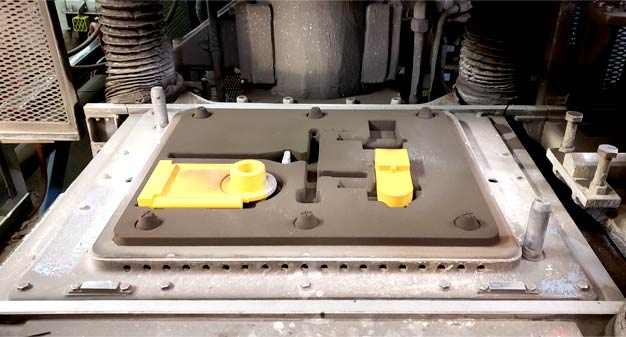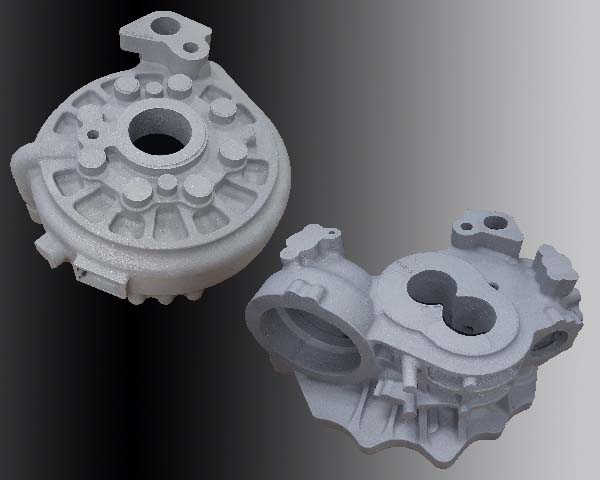The Future of Precision aluminum casting Technology
Wiki Article
Recognizing Aluminum Casting: A Comprehensive Guide to Its Advantages and Applications
Aluminum casting is a procedure that transforms molten aluminum right into solid kinds via various strategies. This method supplies significant advantages, such as light-weight toughness and rust resistance. It discovers applications in numerous markets, mirroring its convenience. Nevertheless, understanding the intricacies of aluminum casting and its finest methods can substantially impact the top quality of the last product. Exploring these aspects reveals truth potential of aluminum casting in contemporary production.The Basics of Aluminum Casting
Aluminum casting is a manufacturing process that changes liquified aluminum right into strong things through different strategies. This procedure begins with home heating aluminum till it reaches its melting point, allowing it to move right into molds. There are several methods of aluminum casting, including sand casting, die casting, and financial investment casting, each ideal for different applications based on design intricacy and manufacturing quantity.In sand casting, molds are created utilizing sand, supplying adaptability for complex forms. Pass away casting includes requiring liquified aluminum right into a steel mold and mildew under high pressure, resulting in repeatable and exact parts. Investment casting, on the other hand, utilizes a wax pattern that is coated with ceramic to create thorough elements.
After the aluminum solidifies and cools down, the molds are gotten rid of, disclosing the ended up items. This casting procedure is integral in different markets, consisting of automobile, aerospace, and durable goods, making it possible for the production of sturdy and light-weight elements.
Benefits of Aluminum Casting
One of the crucial advantages of aluminum casting exists in its ability to create light-weight yet strong parts. This distinct mix makes aluminum a perfect selection for various sectors, consisting of automobile, aerospace, and durable goods. The inherent corrosion resistance of aluminum also boosts the toughness of the cast parts, lengthening their life expectancy and minimizing the demand for maintenance.
Furthermore, aluminum casting permits intricate geometries and intricate styles, which can bring about much more effective and cosmetically pleasing products. The product's outstanding thermal and electrical conductivity even more expands its applications, especially in electronic devices and heat exchangers.
Aluminum recycling is highly effective, adding to environmental sustainability and minimizing manufacturing prices. On the whole, the advantages of aluminum casting position it as a functional and useful remedy for makers seeking to maximize performance while decreasing weight and source use.
Usual Methods of Aluminum Casting
While numerous techniques exist for aluminum casting, each approach provides unique advantages tailored to certain applications. The most typical techniques consist of sand casting, die casting, and financial investment casting.Sand casting, known for its versatility, utilizes sand molds to develop intricate forms and appropriates for both big and little manufacturing runs. Die casting, on the various other hand, uses high-pressure injection of liquified aluminum into steel molds, leading to exact measurements and smooth surfaces, making it perfect for automation.
Financial investment casting, usually referred to as lost-wax casting, entails developing a wax pattern covered with a ceramic shell. Aluminum Foundry. Once the wax is dissolved, molten aluminum is poured right into the dental caries, producing intricate styles and excellent surface finishes
Each More about the author of these approaches plays a necessary function in the aluminum casting landscape, using particular benefits that deal with varying manufacturing requirements and manufacturing scales.
Applications Throughout Industries
The adaptability of aluminum casting methods enables a vast array of applications throughout various markets. In the automotive market, light-weight aluminum components enhance gas effectiveness and performance, contributing to the growing need for electrical lorries. Aerospace industries utilize aluminum spreadings for their strength-to-weight ratio, making certain security and toughness in aircraft production.The building and construction industry benefits from aluminum casting through architectural elements and structural elements that withstand rust and need very little upkeep. In addition, customer electronics suppliers use aluminum spreadings for structures and real estates, stabilizing appearances with capability.
In the marine sector, aluminum castings are preferred for watercrafts and marine equipment as a result of their resistance to deep sea corrosion. Additionally, the clinical field uses aluminum castings in surgical instruments and devices, making certain precision and dependability. In general, aluminum casting's adaptability enables it to meet the varied demands of multiple markets, making it an important production process.
Best Practices for Effective Aluminum Casting
Successful aluminum casting relies upon a combination of mindful prep work, accurate implementation, and complete quality assurance. At first, selecting premium investigate this site aluminum alloys is important, as they directly affect the casting's buildings and efficiency. Correct mold style is essential, assuring that it suits thermal contraction and minimizes problems.During the melting procedure, keeping the appropriate temperature level and avoiding contamination are vital to accomplishing an uniform alloy. Additionally, using efficient putting methods can improve the filling of molds, decreasing the likelihood of air pockets or incorporations.
Post-casting, implementing comprehensive inspection methods, such as visual assessments and non-destructive screening, guarantees that issues are determined early. Employing strenuous high quality control measures throughout the process assists preserve uniformity and dependability in the final products. By adhering to these ideal methods, manufacturers can considerably boost the success and efficiency of their aluminum casting operations.
Frequently Asked Concerns
What Precaution Should Be Taken Throughout Aluminum Casting?

Just How Can Problems in Aluminum Castings Be Reduced?
Problems in aluminum spreadings can be decreased with cautious mold design, appropriate temperature level control, making sure clean steel, using proper putting strategies, and performing detailed assessments to recognize and resolve issues prior to wrapping up the casting process.
What Is the Environmental Impact of Aluminum Casting?
The ecological impact of aluminum casting includes energy-intensive procedures, greenhouse gas discharges, and resource extraction worries. Improvements in recycling and sustainable techniques can minimize these results, advertising a more environmentally friendly approach to aluminum production.Can Aluminum Casting Be Recycled?
Yes, aluminum casting can be recycled effectively. The recycling process calls for substantially less power contrasted to main aluminum manufacturing, making it an eco pleasant choice that adds to resource conservation and reduced carbon discharges.What Are the Expenses Related To Aluminum Casting Processes?
Expenses related to aluminum casting processes include product expenses, labor, tools upkeep, energy intake, and mold and mildew manufacture. These variables can differ significantly based on production range, complexity of designs, and particular production techniques utilized.Aluminum casting is a process that changes molten aluminum right into solid kinds through various methods. Aluminum casting is a production procedure that changes molten aluminum right into strong items via numerous methods. While different methods exist for aluminum casting, each approach uses distinct benefits tailored to particular applications. The ecological effect of aluminum casting includes energy-intensive procedures, greenhouse gas emissions, and resource removal concerns. Prices connected with aluminum casting processes include product costs, labor, equipment upkeep, energy consumption, and mold and mildew fabrication.
Report this wiki page